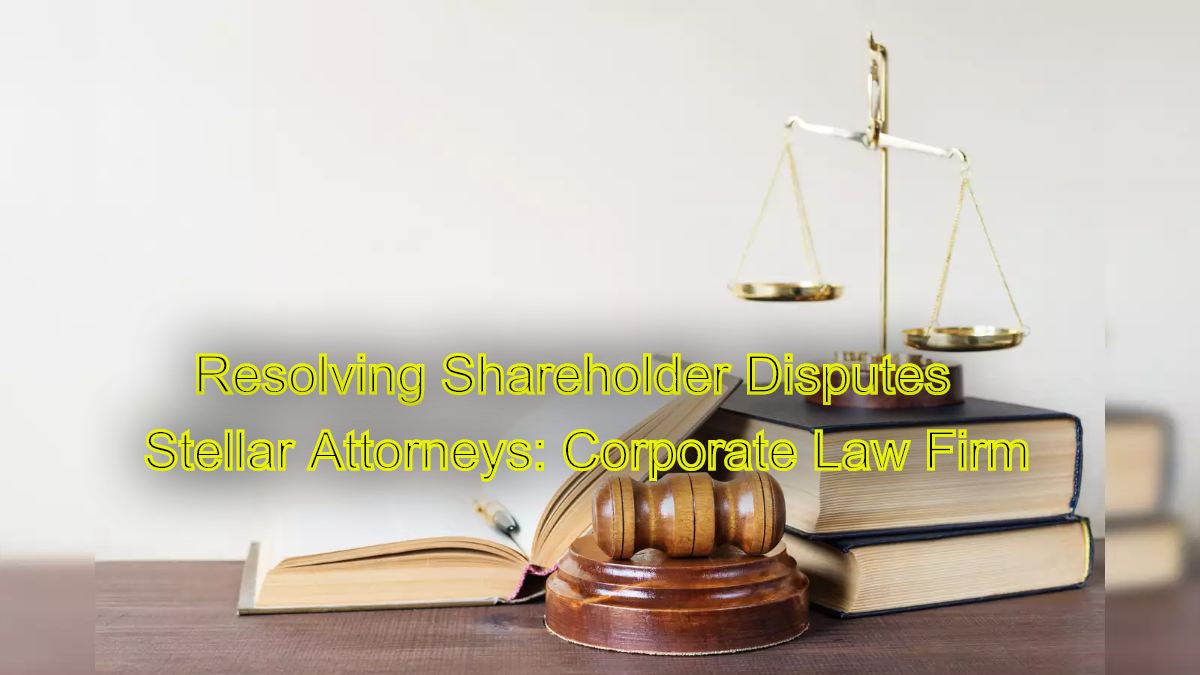Resolving Shareholder Disputes: Shareholder disputes are a common occurrence in the corporate world, arising from disagreements over various issues such as company management, dividend distribution, or the sale of assets. These disputes can have significant consequences for a company’s operations and its shareholders. The Shareholder Agreements Act provides a legal framework for resolving such disputes. Stellar Attorneys, a leading corporate law firm, specializes in navigating the complexities of the Shareholder Agreements Act and offers effective solutions for resolving shareholder disputes.
Resolving Shareholder Disputes: Navigating the Shareholder Agreements Act: Stellar Attorneys: Corporate Law Firm
Understanding Shareholder Disputes
Shareholder disputes can arise due to a variety of reasons, including:
- Differences in business strategy: Disagreements between shareholders regarding the company’s direction and future plans.
- Dividend disputes: Conflicts over the distribution of profits among shareholders.
- Valuation disputes: Disagreements about the fair value of the company or its assets.
- Control disputes: Conflicts over who has the controlling interest in the company.
- Mismanagement allegations: Accusations of mismanagement or breach of fiduciary duty by company directors or officers.
The Role of the Shareholder Agreements Act
The Shareholder Agreements Act provides a legal framework for regulating the relationship between shareholders and the company. It sets out the rights and responsibilities of shareholders and provides mechanisms for resolving disputes. Key provisions of the Act include:
- Shareholder agreements: The Act allows shareholders to enter into agreements that govern their relationship with the company and each other. These agreements can address various issues, such as voting rights, dividend distribution, and dispute resolution mechanisms.
- Mediation and arbitration: The Act encourages the use of alternative dispute resolution (ADR) methods, such as mediation and arbitration, to resolve shareholder disputes.
- Court proceedings: If ADR fails, shareholders can resort to court proceedings to resolve their disputes.
Stellar Attorneys: A Leading Corporate Law Firm
Stellar Attorneys is a renowned corporate law firm with a proven track record in resolving shareholder disputes. Their team of experienced corporate lawyers specializes in navigating the complexities of the Shareholder Agreements Act and providing effective solutions for clients.
Key Services Offered by Stellar Attorneys
- Drafting shareholder agreements: Assisting clients in drafting comprehensive shareholder agreements that address their specific needs and protect their interests.
- Dispute resolution: Representing clients in mediation, arbitration, or court proceedings to resolve shareholder disputes.
- Corporate governance advice: Providing guidance on corporate governance best practices to prevent and mitigate shareholder disputes.
- Share valuation: Conducting valuations of companies and their assets to facilitate fair and equitable settlements.
- Post-dispute resolution support: Assisting clients in implementing the terms of a settlement agreement and resolving any ongoing issues.
FAQs
Common causes of shareholder disputes include differences in business strategy, dividend disputes, valuation disputes, control disputes, and mismanagement allegations.
The Shareholder Agreements Act provides a legal framework for regulating the relationship between shareholders and the company, and it encourages the use of ADR methods to resolve disputes.
ADR methods can be faster, less expensive, and less adversarial than court proceedings. They can also help preserve relationships between shareholders.
Generally, shareholders cannot unilaterally amend a shareholder agreement. Any amendments must be agreed upon by all shareholders or in accordance with the terms of the agreement.
If ADR or court proceedings fail to resolve a shareholder dispute, the company may need to be restructured or liquidated.
Conclusion
Shareholder disputes can have significant consequences for a company’s operations and its shareholders. The Shareholder Agreements Act provides a legal framework for resolving such disputes. Stellar Attorneys, with their expertise in corporate law, can offer effective solutions to navigate the complexities of the Act and ensure a successful resolution of shareholder disputes.
Read More
- Facilitating Foreign Investments: Expertise in the Foreign Exchange Management Act (FEMA)
- Ensuring Data Protection: Understanding the Information Technology Act
- Navigating Employment Laws: Insights into the Employment Contracts Act
- Safeguarding Consumer Interests: Expertise in the Consumer Protection Act
- Advocating for Investor Rights: Understanding the Securities and Exchange Board of India (SEBI) Act
- Ministry of Corporate Affairs (MCA):

![Stellar Attorneys: Corporate Law Firm [Business Lawyers, Company Attorneys and Criminal Advocates]](https://lawyers.org.in/wp-content/uploads/2023/08/cropped-Stellar-Attorneys.png)
